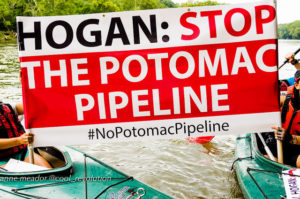Above Photo: From dcmediagroup.us

The Maryland Department of the Environment will hold a hearing on December 19 in Hancock, Md. on TransCanada’s proposed Eastern Panhandle Expansion (also known as the Potomac Pipeline). The 3.4-mile gas pipeline requires a Section 401 water quality certification from the state to complete the federal licensing process under the Clean Water Act. Members of the public can testify at the hearing, which begins at 7pm at Hancock High School.
The pipeline route would traverse a short slice of western Maryland, originating from Fulton County, Pa. and connecting with the proposed Mountaineer Gas distribution line in Morgan County, W.Va. MDE will consider issues related to wetlands and waterways along the pipeline route.
The most controversial part of the Eastern Panhandle Expansion route is the Potomac River crossing. TransCanada proposes to drill underneath the Potomac and lay pipe using a technique called horizontal direct drilling (HDD).
“There’s nothing in it for Maryland but a lot of risk. It’s a no-brainer,” said Jill Clark-Gollub of Sierra Club’s Maryland Chapter on the banks of the Potomac River on November 4. “This is not your old-fashioned pipeline. TransCanada has one of the worst safety records in the world.”
210,000 gallons of dilbit from Alberta tar sands spilled from TransCanada’s Keystone Pipeline in South Dakota on November 16, 2017.
TransCanada’s plan for the Eastern Panhandle Expansion is complicated by drilling in karst limestone geology, which is characterized by underground caverns, sinkholes and porous fissures. Karst geology is unstable and susceptible to erosion, sinkhole collapse, and subsidence (sinking of the ground because of underground material movement).
Upper Potomac Riverkeeper director Brent Walls says his biggest worry is an inadvertent return, or blow out, of drilling fluid during horizontal direct drilling. Accidents under tributaries of the Potomac and the river itself could have terrible consequences.
“A blow out that occurs at or under the Potomac would threaten the public drinking water of over 100,000 people in Washington County, Md., and Berkeley County, W.Va.,” he said via email. “The drinking water intakes for the two counties are just 6 miles downstream from the pipeline crossing.”
Massive accidents involving HDD have occurred in the last year. In April, Energy Transfer Partners spilled several million gallons of drilling fluid and diesel fuel into Ohio wetlands.
“It will take generations to clean up,” Clark-Gollub said of the blow out.
HDD would also be employed along the pipeline route to cross streams, wetlands and roadways.
Leaks are also a concern. Walls estimates that 10,000 drinking water wells, which draw water from karst aquifers, are located along the pipeline path. If the pipeline leaks methane gas into the aquifers, drinking water could be contaminated.
“The Karst geology allows gases to travel much faster through the ground than other types of geology,” he said. “It is unknown the extent of the Karst geology connections and how far pollution may travel.”
WHAT YOU CAN DO
 The MDE hearing will be held on Tuesday, December 19 at 7pm at Hancock High School, 289 W Main St, Hancock, Maryland 21750
The MDE hearing will be held on Tuesday, December 19 at 7pm at Hancock High School, 289 W Main St, Hancock, Maryland 21750
You can RSVP here.
Groups opposed to the pipeline will hold a press conference at 6pm.
Anyone can comment at the hearing, but you must sign up at the door. (Come early.) If you need some help writing your comment, you can get it here.
If you can’t make it to the heating in person, you can still submit a comment to MDE through January 16, 2018. You don’t have to be a Maryland resident to comment.
Maryland Governor Larry Hogan will have the ultimate say in granting or denying the 401 certification. Call his office at 410-974-3901 and say you want the governor to DENY TransCanada the 401 water quality certification for the Potomac Pipeline. Keep calling!

